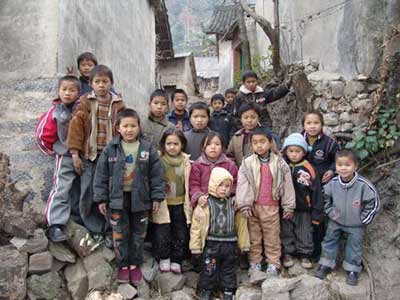| Home / Education / Photos | Tools: Save | Print | E-mail | Most Read |
| Migrant Workers Have 20 Mln Kids at Home |
| Adjust font size: |
More than 20 million children live with their grandparents or other relatives because their parents have migrated to other Chinese provinces in search of work and some youngsters are even forced to live alone.
Eighteen children pose for a picture at a village in Ziyun Miao and Buyi Autonomous County in Southwest China's Guizhou Province, January 22, 2006. Among them, twelve children's parents left the village to work in big cities in coastal areas.
According to a recent China National Children and Teenagers' Working Committee report in agricultural areas like east China's
The number of migrant workers was more than 140 million in 2005, according to The local media often reports on the tragedy of the youngsters. One such case was the death of a 12-year-old in Suzhou of Anhui. The boy killed himself by drinking pesticides last year because he had no one to advise him on how to solve his problems, according to his suicide note. Though the working committee has vowed to organize the children into clubs and find them "acting parents to tackle the problem" their huge number means it could take years before such an arrangement was possible throughout the country. A survey in Chaohu, in About 1 percent, that's more than 1,000 of these children, don't have guardians. Such children have little communication with their parents. Most Chaohu migrants talk to their children over the phone just once or twice a month and return home only during Spring Festival. Some don't even do that, the survey reveals. Deprived of parental love many such children prefer staying alone and often become rebellious. A girl in Chaohu set her grandparents' house on fire last year because she felt they didn't understand her feelings. They often feel frustrated at school, too. A recent survey of the 72 junior high schools in Wuwei County of Chaohu showed that 80 percent of those who flunked the senior high school entrance exam in 2005 were such children, Yu said. Another survey, conducted in Tangchi Town Junior High School of Lujiang County in Chaohu, showed that less than 1 percent of such children passed the senior high school entrance exam. And only 4 percent regularly did well at school, whereas 64 percent remained at a mediocre level and 32 percent often failed exams. If the government wants to help these children it should first make it easier for them to study in the cities where their parents work, Yu said. ( |
| Tools: Save | Print | E-mail | Most Read |
 |
| Related Stories |
